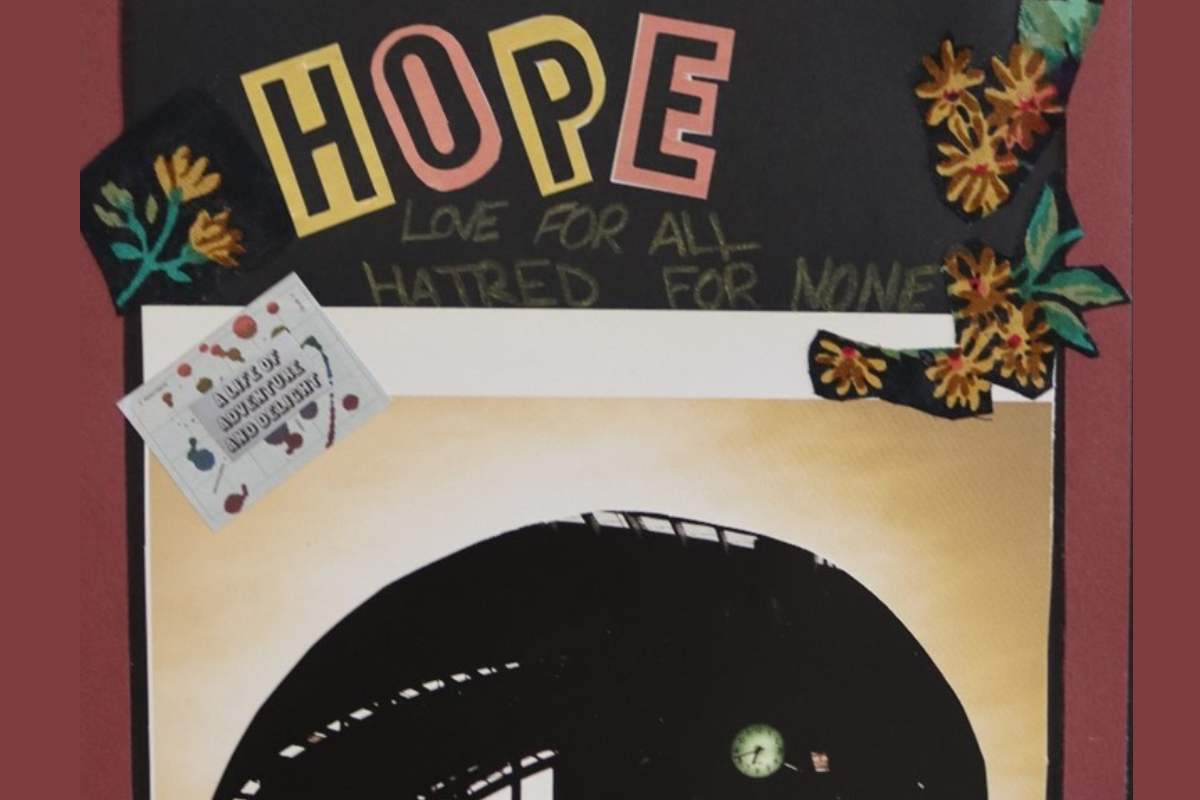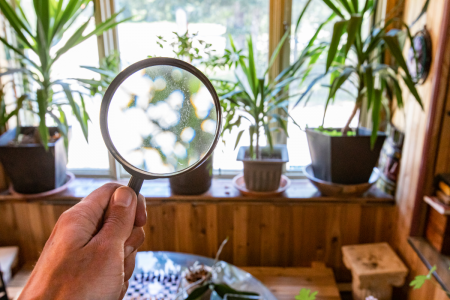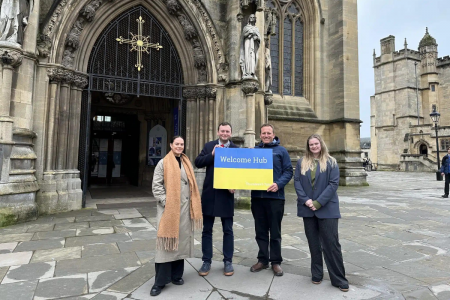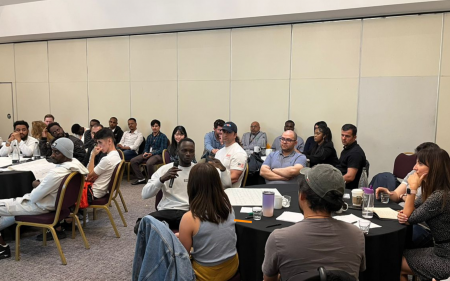
Beyond Housing: Feeling at Home in Bristol
Finding a house, or more importantly, a home is a key tenet of integration. Without a suitable home, citizens-in-waiting lack security, mobility, dignity, and the ability to contribute as independent members of society. Our participants reported finding a home as being one of the most important factors in their ability to integrate. Furthermore, many of the success stories we heard were notably reported by those with stable accommodation, indicating that those who have a home experience greater opportunity and prosperity. Unsurprisingly, therefore, having a home is a prerequisite to feeling at home in the city.
Read the full report here.
Bristol is facing a worsening housing crisis, recently named the most expensive city to live in the UK outside of London (Cork 2023: 1), and the 13th most expensive city in the world to build in (Arcadis 2023: 6). This brings acute challenges to everyone living in Bristol, but further compounds the marginalization of citizens-in-waiting. In thinking beyond housing, we consider the enablers and barriers of being ‘at home’ in Bristol, both in terms of finding stable accommodation and feeling part of a community. As reported by our participants, this chapter encourages you to think about the ways your organization can pull the levers of change.
Did you know…
- “New refugees are most at risk of homelessness” (Refugee Advocacy Forum 2022: 9).
- “During 2022 numbers of individuals housed in Initial Accommodation hotels in the region have grown, representing a tripling of the number of people in the local area” (Bristol Refugee Rights 2022: 3).
- ACH Provide 88 houses in Bristol to accommodate new refugees who risk destitution.
Barriers
- Long waiting lists for social housing - Single adults wait several years for a room.
- Unaffordable private rental market – pushes citizens-in-waiting to the margins of the city in low-income, high-crime areas.
- Poor quality housing – many participants report damp, mould, vermin, and dilapidation.
- Unsafe cohabitation – being unable to choose who you share a room, house, or hotel with puts vulnerable demographics at risk.
- Discrimination - Landlords and Estate Agents reluctant to accept citizens-in-waiting. Exacerbated by the two-tier system introduced by the Nationality and Borders Act wherein deportation is a continuous threat for tier-two migrants, making landlords risk-averse.
- The ‘right to rent’ policy, which is part of a wider strategy to outsource immigration checks to civil society, requires landlords and estate agents to check the immigration status of potential tenants. This encourages covert discrimination wherein landlords avoid renting to anyone with a foreign name or accent as they assume justifiably that it may require extra paperwork.
- All of which maroon citizens-in-waiting to hotels or with host families where there is lack of privacy, cramped living conditions, and immobility for the unforeseeable future.
“I’m limited to where I can live because I’m not willing to change my child’s school another time. It’s heartbreaking. My child had a really tough time adjusting. He is like a tree that you are just pulling out of the ground, removing his roots. And I tried hard to put our life together.”
- Daryna
“The home office has been pressuring me about housing, telling me I need to find accommodation. But it is very difficult, and it is their responsibility to help me. I will be so happy to find a house and start my new life eventually.”
- Abdul
“Landlords and estate agents stereotype refugees as ‘undesirable’. Although ‘No DSS’ has been outlawed, there is still a hidden discrimination.”
- Housing Support Officer
Enablers
For many people who have been forcibly displaced, their country of origin will always feel most like their true home. Dreams of peacetime and family reunions echoed through almost all our conversations. Despite this, citizens-in-waiting can and do foster a ‘home away from home’ under the right conditions. This involves three key factors:
Safety & Security: The stress of precarity can be a debilitating force, which is why meaningful sanctuary is a prerequisite to meaningful opportunity. To thrive as independent members of the community, citizens-in-waiting must be safe and secure in their housing situation. This means being mindful of cultural differences and conflicts when housing uniquely vulnerable groups.
Proximity: When asked about their aspirations for a future in Bristol, participants emphasized the importance of having a house next to the park, near the supermarket, near the school, near the mosque, “the important things” – for them, proximity to the wider community is important for integration. They want to no longer live on the margins, in the distance. They want to be included in social life. Many of those living in temporary accommodation such as hotels or with host families have been there for a year or more and understandably feel part of the local community; their children attending the local school, having a local GP, a familiar place of worship. This demographic feels a weight of anxiety about becoming uprooted once again to find an affordable home in a different part of the city. Rather than taking a ‘beggars can’t be choosers’ approach, citizens-in-waiting must be supported to find stable accommodation which aligns with the integrative progress they have already made.
Self-determination: Beyond housing, citizens-in-waiting can feel at home in Bristol by being included as co-creators in the future of their city. This can involve volunteering opportunities, involvement in community projects such as the Bristol Commons, planting trees and crops in community gardens, contributing to events such as St. Paul’s Carnival, exchanging cultural practices at the Grand Iftar, and being included in the design and implementation of city planning. This is an opportunity, not only for meaningful integration, but to depart from Bristol’s problematic history of migrant exploitation and build social equity into the foundations of its infrastructure.
“I’m lucky to have my own home with enough rooms for me, my wife, and children. This means I can celebrate Ramadan and Eid as I would in Afghanistan, which would not have been possible in the hotel.”
- Taher
“To be honest when we arrived in the UK the government showed us very good hospitality. We were placed in a good hotel. A lot has changed since then, and we’ve been placed in a very good house.”
- Firash
“Yes, of course I like where I live. It is a beautiful area and my neighbours have been very welcoming.”
- Ismail
Recommendations for Action
Housing
- Utilising ‘meanwhile spaces’ that can be occupied at low cost by tenants as property guardians – This is most appropriate for single adults without children who otherwise would be waiting years for social housing (see Case Study 2).
- Local Authorities to provide guarantees to landlords, as citizens-in-waiting often struggle to find guarantors or references after living in hotels or with host families for long periods of time.
- The ‘move on’ support designed to assist Ukrainians in finding a new home must be extended to all citizens-in-waiting demographics.
- Tenants’ demographics must be represented in staffing - Citizens-in-waiting must be included in the design of services and in the decision-making process. This will cultivate better cultural awareness from frontline services to prevent behavioural misunderstanding and Othering. Organisations can achieve this by joining the Stepping Up Initiative.
- Safe spaces – making sure that vulnerable demographics such as LGBT+ migrants are safeguarded and living in appropriate accommodation that is safe and accepting.
Community Building
- Inclusion as a policy stance – Include citizens-in-waiting in the Levelling Up agenda’s mission to “Restore a Sense of Community, Local Pride and Belonging”.
- To extend the Welcome Hubs - which have been a resounding success in creating a ‘home away from home’ for Ukrainians - to other citizens-in-waiting communities.
- Increase engagement with community-building projects such as Coexist’s Bristol Commons project, Community Kitchen, and the Living Soil Project. Initiatives such as these which mobilise and empower communities to create new spaces and events can give citizens-in-waiting a stake in their built environment and a sense of authorship in the future of the city.
- Organisations such as Bridges for Communities are already doing excellent work to foster a home away from home with their Walk with Me and Befriending programs.


